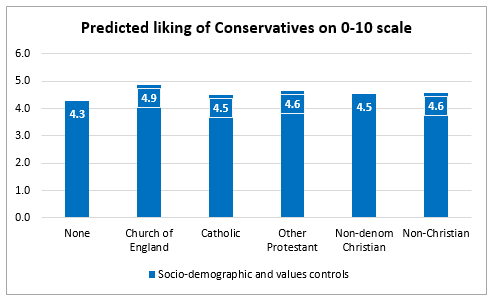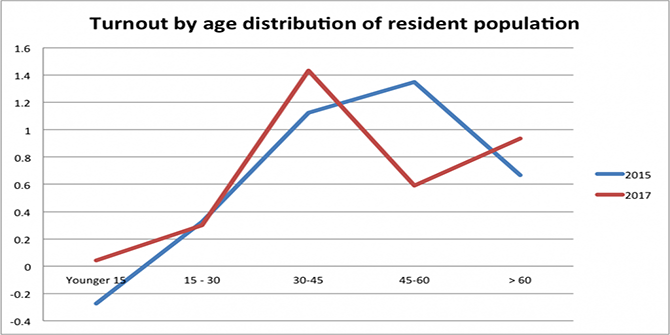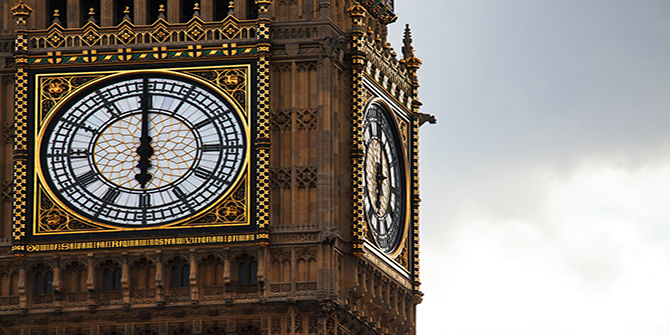 Siobhan McAndrew investigates the most recent wave of the British Election Study online panel. She finds that overall religious affiliation matters for how people feel towards the major parties but there is a substantial overlap between religious affiliation and other identities and basic values.
Siobhan McAndrew investigates the most recent wave of the British Election Study online panel. She finds that overall religious affiliation matters for how people feel towards the major parties but there is a substantial overlap between religious affiliation and other identities and basic values.
Social scientists have become interested in cultural values and how they explain the seismic political events of the past year or so. Religion is one manifestation of such basic values, occupying an interesting space in the social sciences. In some ways, we are born to a family religious or irreligious background, which is often intertwined with ethnic and national identity; in this way, it is a demographic category. In other ways, religion may form part of our lifestyle and community life, and is akin to social and cultural participation. In others still, religion and irreligion structure our worldviews and morality, and concepts from social psychology serve best to explain how they function.
In Britain, religion has been largely peripheral to politics. We don’t have confessional parties, and any remaining association between religion and party preference seems an interesting but unimportant hangover of the long nineteenth century, when the divide between Conservatives and Liberals had a religious dimension. Further, remaining association might nowadays be more reducible to immigrant background or ethnic minority identity, with ethnic minority members having a high propensity to support Labour. That the Anglican Church was once described as ‘the Conservative Party at prayer’ is seen as simply an interesting anecdote, one to revive whenever pollsters find Anglicans more likely to vote Tory. Equally, the Labour Party was once described as owing more to Methodism to Marxism; with secularisation and the rise of market liberalism, it’s questionable how much of either really remain in the party’s DNA.
The relative lack of importance of religion for British politics has been questioned more recently, however. Many new political movements in the 2000s, notably Citizens UK, drew supporters from those highly active in churches, mosques and other places of worship. In 2010, Citizens UK hosted one of only four leaders’ debates during the election campaign at Methodist Central Hall. In July 2016, Greater Manchester Citizens was established as a local chapter with Oxfam, the Catholic Diocese of Salford, Unison, the Royal College of Nursing, the Tudor Trust, the Jesuit order and Human Appeal as founding partners.
Having a religious upbringing is also associated with a stronger sense of civic duty: religion appears to inculcate the ‘habits of the heart’ underpinning democratic society. Eisenhower famously put it thus in 1952: ‘our form of government has no sense unless it is founded in a deeply-felt religious faith, and I don’t care what it is. With us of course it is the Judeo-Christian concept, but it must be a religion with all men are created equal’.
Work by the political scientists James Tilley and Martin Steven has reaffirmed the continuing and indeed growing importance of faith for British politics. In ‘We Don’t Do God’, Tilley found that a religious cleavage based on religious affiliation still shapes the present: religious denominations have long-standing associations with parties, and these associations are passed from parents to children. In a study of Christianity and party politics, Steven identified that the political importance of equalities/rights-based issues is increasing. Secularism is weaker in Britain than in continental Europe, and apparently closer to the US in viewing religion as complementary to liberal democracy rather than in conflict with it.
Moreover, there has been increasing attention paid to the faith and worldviews of party leaders. Theresa May is known to attend church weekly and has said that ‘I am a vicar’s daughter and still a practising member of the Church of England’. Tim Farron is an evangelical Christian. Jeremy Corbyn appears to be irreligious but has attended places of worship frequently for many faiths through his campaigning and protest work, and has stated that he believes that ‘faith communities are essential allies in the struggle’.
So, is religion likely to matter in the coming election? I investigated the most recent wave of the British Election Study online panel (November-December 2016) to find out. This offers a rich array of measures of political attitudes beyond party identification and intended vote choice.
It is tempting to compare party identification or vote intention across religious groups. In this case, however, I examine what is termed party affect instead, with ‘affect’ used in the psychological sense of emotion, or liking. This is because the BES includes measures of liking for each major party on a 0-10 scale. Accordingly, we can see how those with a Conservative identification also feel about UKIP and Labour, and so on; and furthermore capture the strength of liking or disliking.
Respondents were asked, ‘Using a scale that runs from 0 to 10, where 0 means strongly dislike and 10 means strongly like, how do you feel about the [Conservative, Labour, Liberal Democrat, UKIP, Green] Party?” I looked at average score by broad religious affiliation – None, Anglican, Catholic, Other Protestant, Non-denominational Christian, Non-Christian – and have graphed them below. It is notable that the scores are generally below 5, with the exception of an average score of 5.6 by Anglicans towards the Conservative Party. The lowest featured is 2.3, by non-Christians towards UKIP. Non-Christians and Catholics appear to show a stronger liking for Labour, while non-Christians also exhibit more warmth towards the Greens than other groups. For the Lib Dems there seems to be little variation across religious groups.
Figure 1: Average Liking of Political Parties by Religious Affiliation, November-December 2016.
Source: British Election Study. Unweighted N = 24980.
But do these apparent differences still hold once taking account of the generational, occupational and ethnic composition of each group – and how they differ in terms of basic values? If so, we can be more sure that differences are really down to religious affiliation after taking account of confounding variables. I accordingly analysed party liking by religious affiliation, taking account of gender, marital status, social generation (being born before the end of the Second World War, being a Baby Boomer, a member of Generation X or Generation Y), education, occupation (professional, intermediate, routine), and ethnic group membership. In a second set of models, I add further controls for subjective social class membership, self-perceived Englishness, a measure of left-right values, and a measure of libertarian-authoritarian values.
Our model results and predictions are graphed below, for each party in turn. For those who would like to see full tables of the model results, view them here, including details on how control variables were created (you should refer to the results denoted ‘model (b)’). Note that these results are for respondents in England only, because I have included a measure of strength of Englishness, which screens respondents in Wales and Scotland out.
For the graphs below, I predict what the ‘liking’ score will be when other predictors are set to their mean values, for each religious group in turn. I then test whether these liking scores are significantly higher or lower than those for religious nones. In the graphs below, where the scores are significantly different from those for nones, the data label is outlined. Otherwise, the data label has the same format as for the bar for nones.
Figure 2: Predicted Liking of Political Parties by Religious Affiliation, November-December 2016.
Source: British Election Study. Unweighted N = 13885.
What we see is that in the case of the Conservatives and UKIP, the apparent difference between Anglicans and nones is somewhat attenuated, once subjective class, Englishness, right-wing values and authoritarianism were taken into account. For Labour, the original negative Anglican effect washes out, while the Catholic effect (compared with nones) is small but positive, as is that for non-denominational Christians. For Lib Dems, the inclusion of controls and particularly those for libertarian-authoritarian values also matters: we now see that nonconformists feel warmer towards the Lib Dems than nones. For UKIP, a positive effect of being Anglican or other Protestant rather than none on feelings towards UKIP remains. For the Greens, once controls are taken into account, the higher warmth suggested in the first graph among nones and non-Christians towards Greens disappears: the religious groups look essentially similar.
Overall, the results suggest that religious affiliation matters for how people feel towards the major parties. The detailed tables also suggest that there is a substantial overlap between religious affiliation and worldviews and identities. Once Englishness and authoritarianism in particular are taken into account, the effect of religious affiliation attenuates to a certain extent. It is difficult to pull them apart, of course: many adherents would view their liberalism or respect for authority, or their particular patriotic or cosmopolitanism worldview as bound up with who they are and with their faith. Religious people tend to be more conservative politically, and to support the status quo rather than new social arrangements. In that case, we might assume that the effects of religion and of worldview and identity might reinforce each other.
However, by taking account of religion, ethnic and other identities and basic values separately, we also identify where they work differently. For example, in the full model of predicting liking the Conservative Party, there is no clear ethnic minority penalty for the Conservatives, and indeed no religious minority penalty: position on the left-right and libertarian-authoritarian values scales and a sense of Englishness are much stronger predictors. For Labour, the full model finds that ethnic minority group membership predicts liking, but religious minority effects are not found. We also see that even when authoritarian values and English identity are taken into account, being Anglican rather than none predicts liking for right-wing parties (UKIP and the Conservatives), but not the left or centrist parties (Labour, the Lib Dems and Greens).
What this means for mobilising particular communities is less clear. We don’t have a measure of religious attendance in the dataset at present to allow further testing of how far the religious affiliation effects reflect identity or active participation: many who report a religious affiliation don’t attend church. Ethnic minority group members in particular often find places of worship to be sites of ‘refuge, respect and resources’, and so in the civic world ethnicity and religion may often be conflated. Politicians engage with faith communities where they perceive it worthwhile, for electoral reasons of course, but all sorts of other reasons too – the desire to be embedded in their community and learn from it in all its richness. And many are religiously-active themselves. But whether such engagement is a good use of time compared with national parties having a clear and credible expression of their values – appealing to an electorate increasingly differentiated along various dimensions of such basic values – remains an open question.
______
Note: this article was originally published on LSE Religion and the Public Sphere.
 Siobhan McAndrew is Lecturer in Sociology with Quantitative Research Methods at the University of Bristol. She specialises in the social science of religion and culture. Stata syntax to reproduce the results above is available from the author on request.
Siobhan McAndrew is Lecturer in Sociology with Quantitative Research Methods at the University of Bristol. She specialises in the social science of religion and culture. Stata syntax to reproduce the results above is available from the author on request.

















